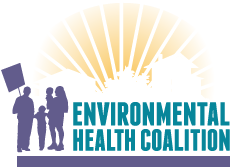• Assessment released today sets baseline data to more easily evaluate City of San Diego’s progress moving forward
• Plan recommends immediate action in the areas that will have the most impact: mass transit and community investment
SAN DIEGO, October 22, 2018 – Today, Environmental Health Coalition and social justice leaders released a comprehensive assessment of City of San Diego’s Climate Action Plan that investigates how effectively the City invested in low-income communities of color. With little to no data recorded or progress evaluated since the Plan’s adoption in 2015, San Diego’s environmental justice communities continue to carry a greater burden of the harmful effects of climate change. Today’s in-depth report sets baseline data in six categories and highlights increased mass transit and direct investment in the most impacted communities as immediate solutions the City must implement to protect the region.
For Start Here, Start Now: An Environmental Justice Assessment of the City of San Diego Climate Action Plan, Environmental Health Coalition, Center on Policy Initiatives and SanDiego350, investigated six key areas of the Climate Action Plan: program funding and capacity, transit, air quality, energy democracy, climate resiliency, and energy and water efficiency. Each section assesses progress, analyzes the allocation of funds and provides immediate recommendations to advance environmental justice.
“All people deserve the right to live, work and play in a healthy and safe environment,” said Carolina Martinez, policy director at Environmental Health Coalition. “In San Diego, disadvantaged communities are hit first and worst by the harmful impacts of climate change. They experience the largest amounts of greenhouse gas emissions and toxic pollution known to cause serious health impacts. With this baseline assessment, we are sending a loud and resounding message to the City of San Diego to start investing here in our communities and start increasing transit options now.”
Major Findings from the Start Here, Start Now Assessment
Though the report outlines baseline data and next steps into six categories, continued Martinez, the City of San Diego must focus on transportation and direct investment in EJ communities as its priority actions to make an immediate impact.
- Transportation: efficient and affordable mass transit options
Transportation continues to be the single-largest source of greenhouse gas emissions in San Diego (page 24). Environmental justice communities in San Diego have more than triple the number of transit-dependent households compared to the city overall. Solutions in environmental justice communities should include expansion of mass transit and improved pedestrian and bike infrastructure and a minimum of two staff dedicated to this work by 2019. This would require the City to work with the regional transportation agency to align regional funding with these goals.
- Direct Community Investment : when cities advance EJ, everyone benefits
Over the last three years, no public data has been available on how much funding has been invested in environmental justice communities since the adoption of the Climate Action Plan (page 21). The City must increase direct investment in environmental justice communities to be proportionate to the size of those populations – at least 60 percent by 2020. - Air Quality: increase zero-emission mass transit and heavy duty trucks
In the City of San Diego, 90 percent of census tracts with the worst air pollution due to diesel emissions are located in environmental justice communities (page 32). The City must advocate at SANDAG and the State of California for investment in zero-emission vehicle technology and heavy-duty freight equipment to achieve improvements in air quality and public health. This should include adding an air quality strategy into the Plan moving forward.
- Climate Resiliency: increase tree-canopy coverageThirteen percent of the City of San Diego has tree-canopy coverage to provide shade and natural resources, while environmental justice communities average only 10.6 percent (page 40). The City must pursue funding to implement the City’s Urban Forestry Program Five Year Plan in these communities.
- Energy Democracy: renters need clean energy
Other communities have more than double the residential solar than environmental justice communities in San Diego because of barriers making solar difficult to access and afford for all people (page 35). The City must advocate for funding from state programs for solar in environmental justice communities and collaborate with energy providers to lock-in rates and educate environmental justice communities.
- Energy and Water Efficiency: increase funding and incentives
The lack of energy and water efficiency in low-income communities means no co-benefits like lower cost and immediate health improvements for the most vulnerable residents. The City must pursue additional funding and incentives to help low- and moderate-income households and businesses in environmental justice communities to implement energy and water efficiency measures (page 44).
“We all live in San Diego for the chance at a better life, but my experience has been nothing short of challenging,” said Esperanza Gonzalez. “While I’m glad our elected officials have recognized climate change as an issue, I’m disappointed they haven’t prioritized our families who are impacted the most. Through the years, the City has installed a few safety measures, but since the Climate Action Plan’s adoption in 2015, we haven’t seen any significant action in our communities.”
To read the full Start Here, Start Now assessment, click here. For interviews with experts on this data and the environmental justice leaders working to increase transit options and community investment in San Diego, contact Angela Rivera at Esta dirección de correo electrónico está siendo protegida contra los robots de spam. Necesita tener JavaScript habilitado para poder verlo. or (619) 254-3818.
###
ABOUT ENVIRONMENTAL HEALTH COALITION
Founded in 1980, Environmental Health Coalition (EHC) builds grassroots campaigns to confront the unjust consequences of toxic pollution, discriminatory land use and unsustainable energy policies. Visit online at http://www.environmentalhealth.org.

